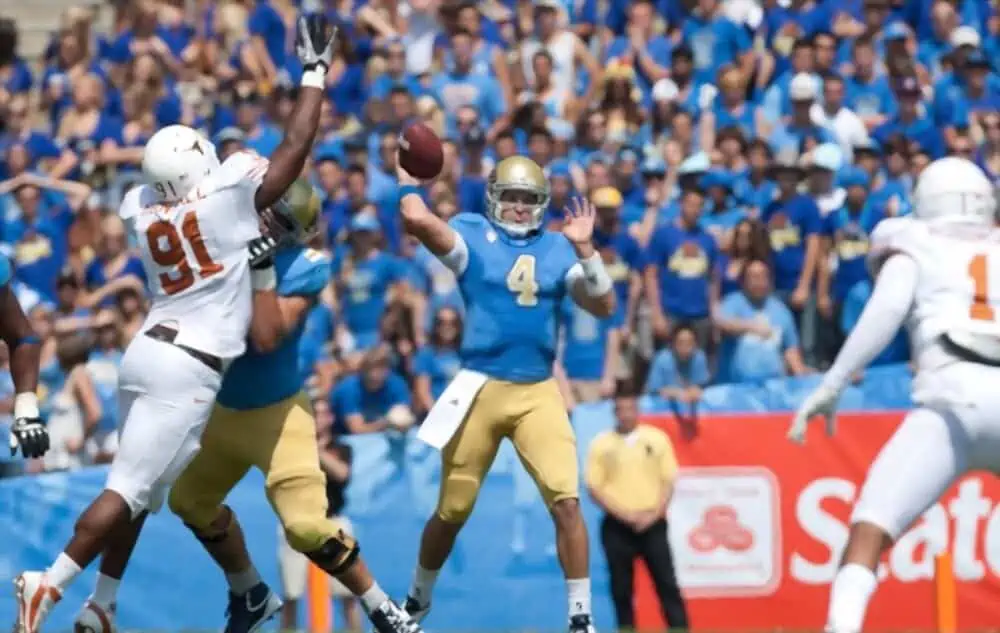Graduate school is a period of solid academic pursuits, research obligations, and professional development. It is a period during which students immerse themselves in their chosen fields.
They are attempting to broaden their knowledge and expertise. Nonetheless, in the middle of the rigors of graduate study, the issue arises: Can graduate students also participate in sports?
Can Graduate Students Play College Sports?
Graduate students can participate in sports while pursuing advanced degrees as long as they negotiate the difficulties and balance academics and athletics. Sports provide many advantages, including improved physical and mental well-being, social engagement, and time management skills.
Yet, we must recognize graduate students’ difficulties, such as academic obligations, financial constraints, and restricted competitive options. Graduate students can incorporate sports into their lives by using tactics such as prioritizing, requesting institutional support, and investigating non-competitive possibilities.
The experiences of successful student-athletes show that graduate students may achieve both with determination, time management, and the correct support structure.
Benefits of Graduate Students Playing Sports
Participating in sports throughout graduate studies provides many benefits that benefit both physical and mental well-being.
1. Developing Teamwork and Leadership Skills
Sports also promote the development of collaboration and leadership abilities. Graduate students can learn to interact, communicate, and motivate others, which will help them in their academic and career pursuits.
2. Discipline: The Backbone of Success
Discipline is a vital characteristic that underpins achievement in any trial, including graduate school. Sports help discipline on many levels. It entails committing to frequent practice sessions, following training regimens and consistently focusing on performance improvement.
Graduate students gain a strong work ethic, self-control, and how to overcome challenges and setbacks through athletics. Their athletic dedication bleeds over into their academic activities.
Graduate students who participate in athletics have the mental tenacity to manage complex research projects, negotiate challenging coursework, and persevere in stressful situations. They can fulfill deadlines, maintain consistent study habits, and manage their workload because of their disciplined attitude.
3. Effective Priority
Sports participation necessitates effective priority. Balancing training sessions, matches, and academic responsibilities requires deliberate decisions about managing time and resources.
Graduate students who participate in athletics learn to prioritize, manage their time well, and cut non-essential activities. These abilities transfer into their academic lives, allowing them to identify critical tasks, set realistic goals, and organize their efforts well.
4. Improved Physical Fitness and Health
For starters, it improves physical fitness and wellness. Graduate students spend extended periods sitting and working on research or projects. Incorporating sports into their daily routine aids in the prevention of sedentary behavior and encourages an active lifestyle.
5. Resilience
Sports also help to build resilience. Confronting difficult opponents, enduring physical strain, and overcoming failures fosters mental strength and the ability to recover from setbacks.
This resilience carries over into their academic careers, allowing them to negotiate the ups and downs of graduate school with drive and a good attitude.
6. Social Interaction and Networking
Graduate students enjoy sports as well as social contact and networking opportunities. They can connect with other students and staff outside the classroom by joining sports teams or clubs. These connections promote community, establish support networks, and lead to meaningful friendships and collaborations.
7. Stress Relief and Mental Rejuvenation
Sports provide a significant outlet for stress release and mental refreshment. Endorphins get released, Mood improves, and anxiety reduces, allowing students to return to their academic endeavors with a fresh perspective.
Challenges Faced by Graduate Students in Playing Sports
While sports’ benefits are apparent, graduate students encounter unique hurdles in reconciling athletics with their demanding academic commitments.
1. Funding Limitations for Sports Participation
Financial constraints often provide difficulties for graduate students interested in sports. Many sports need equipment, membership, or participation fees, which can strain limited student finances.
Graduate students rely on scholarships, assistantships, or part-time work to fund their academic pursuits, leaving little money for athletic expenses. This financial constraint can make participating in sports or obtaining the materials needed for training and tournaments difficult.
2. Heavy Workload and Research Commitments
The heavy workload and research responsibilities of graduate studies are a considerable barrier.
3. NCAA Eligibility Rules and Limitations
Due to NCAA eligibility restrictions, graduate students may suffer limitations and limited competitive chances. These rules apply only to undergraduate student-athletes, limiting graduate students’ ability to compete in collegiate sports.
This limited access to competitive venues might discourage those wishing to pursue sports while pursuing academic degrees.
4. Time Constraints and Scheduling Conflicts
Research projects, coursework, and the pursuit of academic success all need significant time and effort, leaving little time for physical activities. Scheduling problems emerge, making providing adequate time for academic and athletic commitments difficult.
Tips for Graduate Students to Engage in Sports

Despite the difficulties, graduate students can participate in sports while fulfilling their academic obligations. Here are a few strategies that can help:
- Create a Schedule to Balance Academics and Sports: Prioritization and time management are essential. Graduate students can give specific time slots for academic duties and athletic activities by designing a plan that balances both.
- Efficient Study Techniques and Task Prioritization: Using effective study methods like the Pomodoro Technique, which involves taking short breaks after concentrated work, you can enhance your productivity and still have time to engage in physical activities.
- Engage with Faculty and Advisors for Guidance and Flexibility: Engaging with instructors and advisers to express their interest in sports can promote understanding and lead to modifications allowing sports participation while maintaining academic achievement.
- Explore Non-Competitive Sports and Recreational Activities: Non-competitive sports and recreational activities are other options for graduate students. Participating in intramural sports or campus organizations provides a more flexible and less demanding sports experience. These activities allow people to participate in sports for recreation, fitness, and social contact without the stress of high-level competition.
- Seek Institutional Support: For graduate students interested in sports, seeking institutional support is critical. Investigating sports programs and resources for graduate students can provide significant insight and flexibility.
Conclusion
As a graduate student, participating in athletics can enhance your educational experience, contribute to personal growth, and foster a well-rounded approach to life.
Graduate students can thrive in both disciplines by striking the correct balance between academics and athletics, resulting in overall development and a rewarding graduate adventure.

Sam is a brilliant young Nigerian biochemistry student and an aspiring entrepreneur. Despite facing many challenges, he has never lost his passion for learning and drive to make a difference in the world. Read more about him here.